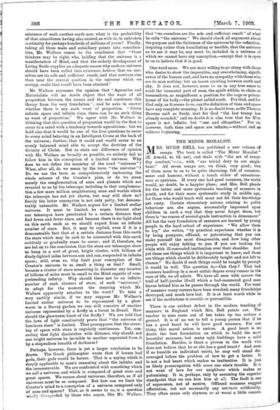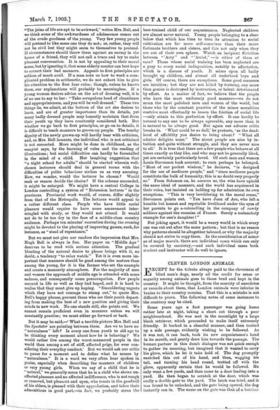THE MINOR MORALIST.
MRS. HUGH BELL has published a new volume of essays. The book is called "The Minor Moralist" (E. Arnold. 4s. 6d. net), and deals with "the art of every.
day conduct,"--i.e., with "our trivial duty to our neigh- bour." All seven essays are, we think, very good ; two
of them seem to us to be quite charming, full of common- sense and humour, without a touch either of censorious- ness or cynicism. If every one had good manners, the world would, no doubt, be a happier place; and Mrs. Bell pleads for the better and more systematic teaching of manners in youth, and for their more systematic study in middle age, for those who would teach well must not .let their knowledge get rusty. Certain elementary axioms relating to polite behaviour are, she argues, successfully impressed upon children in such a way that they never forget them, but there is "no course of second-grade instruction in demeanour." All but the very foundation of manners are learned by young people in the hard school of experience. "We allow them to try," she writes, "by practical experience whether it is by being pompous, offhand, or patronising that you can make yourself the most disagreeable, and how long other people will enjoy talking to you if you are looking the while with ill-concealed inattention over their shoulder. And yet these are things which it is important to know, and these are things which should be deliberately taught and not left to chance." No doubt if such things could be taught by precept it would be well. The question is,—Can they ? That bad manners handicap in a most unfair degree every runner in the race of life, we all admit. We have all seen with sorrow the trail of half-jocular illwill which a bad-mannered good man leaves behind him as he passes through the world. For want of manners many careers have been wrecked, many friendships destroyed, and much love lost. It is at least worth while to see if the misfortune is curable or preventible.
There is one evident defect in the modern teaching of manners in England which Mrs. Bell points out. The teacher in nine cases out of ten takes up too serious a ground. It is of no use to tell a young person that if be has a good heart he will have good manners. For one thing, this moral axiom is untrue. A good heart is no doubt the best foundation on which to build the most beautiful manners, but many ugly buildings have a solid foundation. Besides, is there a person in the world who does not believe that he or she has a good heart ? And even if so humble an individual exists, he may well stand dis- couraged before the problem of how to get a better. It is not a bad heart which makes us inattentive. It is just as likely preoccupation with some one else's trouble. It is not want of love for our neighbour which makes us patronising. It is, perhaps, only by assuming the superior standpoint that we can love him at all. The fault is one of expression, not of motive. Offhand manners suggest affectation, but not necessarily any intrinsic artificiality. They often mean only shyness, or at worst a little conceit. "The joins of life are apt to be awkward," writes Mrs. Bell, and we think some of the awkwardness of adolescence comes out • of the crude goodness of the young. Very few young people
• will pretend to like some one they do not; or, rather, they will not be civil lest they might seem to themselves to pretend. If circumstances should throw them against an enemy in the house of a friend, they will not call a truce and try to make pleasant conversation. It is not by appealing to their moral sense, but by ignoring it, that some elderly mentor can best hope to correct their bad manners. Appeals to first principles are seldom of much avail. If a man asks us how to work a com- plicated problem in arithmetic, we do not exhort him to give his attention to the first four rules; though, unless he knows them, our explanations will probably be meaningless. If a young woman desires advice on the art of dressing well, it is of no use to say to her: "Take scrupulous heed of cleanliness and appropriateness, and you will be well dressed." These two things lie, we admit, at the bottom of the art she desires to learn, and are of greater importance than its details, yet many badly dressed people may honestly maintain that from their youth up they have constantly considered both. But whether we go back to first principles, or go on to details, it is difficult to teach manners to grown-up people. The touchy dignity of the newly grown-up will hardly bear with criticism, and, as Mrs. Bell laments, the individual who is not criticised is not corrected. More might be done in childhood, as the essayist says, by the learning of rules and the reading of illustrations ; but social difficulties can hardly be forestalled in the mind of a child. Her laughing suggestion that "a night school for adults" should be started wherein well- chosen lecturers should deal in general terms with the difficulties of polite behaviour strikes us as very amusing. How, we wonder, would the lecturer be chosen? Would rank or reason decide the choice ? If the scheme succeeded, it might be enlarged. We might have a central College in -London controlling a system of "Extension lectures" in the provinces. Provincial work would, of course, differ slightly from that of the Metropolis. The lectures would appeal to a rather different class. People who have little social pleasure would require to have some amusement inter- mingled with study, or they would not attend. It would not do to be too dry in the face of a middle-class country audience. Perhaps ten minutes' recreation during the evening might be devoted to the playing of improving games, such, for instance, as "stool of repentance."
But we must not give oar readers the impression that Mrs. Hugh Bell is always in fun. Her paper on "Middle Age" deserves to be read with serious attention. The gradual blunting of the natural desire to please brings with it, no doubt, a tendency "to relax watch." Yet it is even more im- portant that manners should be good among the mature than among the young, for it is the former -who set the example and create a mannerly atmosphere. For the majority of men and women the approach of middle age is attended with some sadness, and consequently some preoccupation. Few people succeed in life so well as they had hoped, and it is hard to realise that they must give up hoping. "Smouldering regrets which they have not courage to stamp out," to quote Mrs. Bell's happy phrase, prevent those who see their youth depart- ing from making the best of a new position and giving their minds to new work. No one stands still, she points out. We cannot remain proficient even in manners unless we will constantly practise; we must either go forward or back.
But it may be said,—` What a terrible picture Mrs. Bell and the Spectator 'are painting between them. Are we to have no " naturalness " left? Is every one from youth to old age to be thinking every moment about how he is behaving ? We would rather live among the worst-mannered, people in the world than among a set of stiff, affected prigs, for ever con- sidering their everyday conduct.' But we would ask our critic to pause for a moment and to define what he means by "naturalness." It is a word we very often hear spoken in praise, especially when describing the manners of children or very young girls. When we say of a child that he is "natural," we generally mean that he is a child who shows un- affected pleasure and no affected indifference, who is not rough or reserved, but pleasant and open, who trusts in the goodwill of his elders, is pleased with their approbation, and takes their admonitions in good part,—in fact, we probably mean the best-trained child of our acquaintance. Neglected children are almost never natural. Young people belonging to a class below that which has time to turn its attention to social cultivation are far more self-conscious than their more fortunate brothers and sisters, and this not only when they are out of their own sphere. Watch an incipient flirtation between "Airy" " and " 'Arriet," — is either of them at ease? Those whose social training has been neglected are a prey to every social indisposition, notably to affectation, which is a disease of youth. It seizes upon all badly brought up children, and almost all underbred boys and girls. Of course, there are exceptions. Some good manners are intuitive; but they are not killed by training, any more than genius is destroyed by instruction, or talent deteriorated by effort. As a matter of fact, we believe that the people who have the most uniformly good manners—we do not mean the most polished men and women of the world, but those who by the constant practice of the minor moralities contrive most effectually to lessen the friction of social life —only attain to this perfection by effort. It can hardly be natural to any one to be always agreeable, any more than it is natural to be always good. But again our adverse critic breaks in. What could be so dull,' he protests, 'as the dead- level of affability you desire to bring about ? "What all admire delights none." The nicest people are nice by in- tuition and quite without struggle, and they are never nice to all.' It is true that there are a few people who behave at all times exactly as they like, and who may not be generally liked, yet are certainly particularly loved. Of such men and women Louis Stevenson took account; to such perhaps he belonged. "Moat of our pocket wisdom," he declares, "is designed for the use of mediocre people," and "since mediocre people constitute the bulk of humanity, this is no doubt very properly so." From Solomon on, he assures us, the wise have upheld .the same ideal of manners, and the world has acquiesced in their rules, but insisted on holding up for admiration its own exceptions. "This is very bewildering to the moral sense," Stevenson points out. "You have Joan of Arc, who left a humble but honest and reputable livelihood under the eyes of her parents to go a-colonelling in the company of rowdy soldiers against the enemies of France. Surely a melancholy example for one's daughter ! "
But joking apart, it would be a weary world in which every one was cut out after the same pattern; but that is no reason why patterns should be altogether tabooed, or why the majority should not strive to copy them. In the consideration of minor as of major morals, there are individual cases which can only be covered by casuistry,—and such individual cases both student and instructor will do well to ignore.











































 Previous page
Previous page